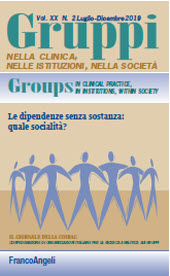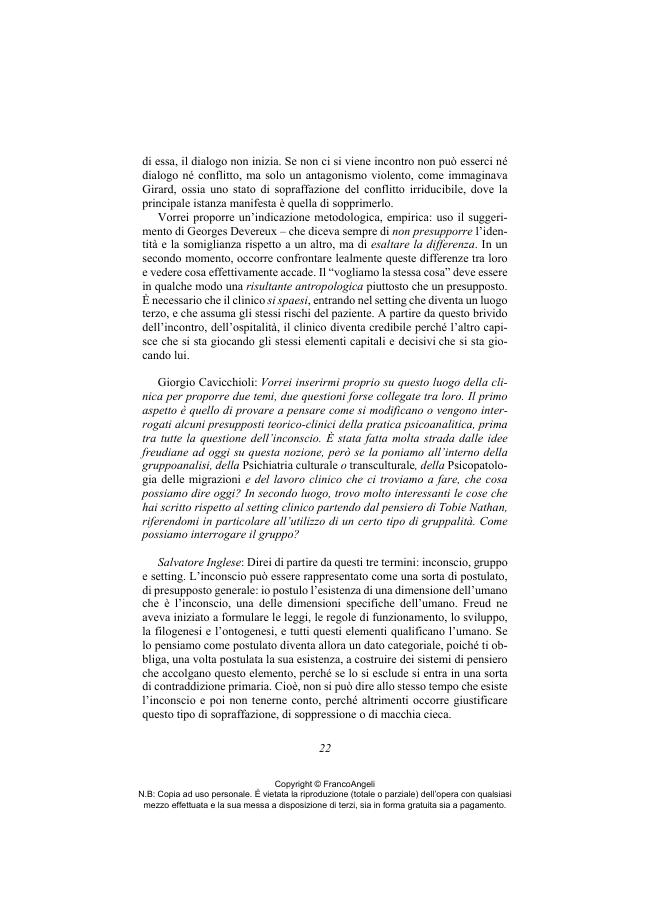2019 - Franco Angeli
Article
Digital Version
Download | Copy/paste | Printing
Intervista a Salvatore Inglese
13-31 p.
- In questa intervista lo psichiatra Salvatore Inglese, pioniere italiano dell'etnopsichiatria, dialoga con alcuni membri della redazione di Gruppi, sui grandi fenomeni migratori. Viene discusso il rapporto conflittuale fra il desiderio di incontrare e mescolarsi con gli estranei, e il bisogno di sperimentare un forte senso di appartenenza attraverso confini e tradizioni ben definiti. Riflettendo sull'inevitabilità del conflitto insito nell'incontro con lo straniero e sulla necessità di farsene carico, l'intervistato sottolinea la specifica necessità dell'etnopsichiatria di affrontare l'incolmabile differenza esistente fra gli interlocutori.
- Ciò sollecita un interrogativo sugli stessi presupposti teorici della psicopatologia e della clinica oc-cidentali e sulla necessità di porre una grande attenzione alla cura di chi vive in prima linea l'accoglienza e la cura degli immigrati e delle comunità accoglienti. Riguardo ai presupposti teorici, Salvatore Inglese affronta il tema dell'inconscio e del gruppo, intesi come elementi naturali, e del setting, inteso come elemento istituito in grado di evidenziare e dinamizzare il rapporto fra questi. Richiamando il pensiero di Georges Devereux e di Tobie Nathan, viene discusso come il problema lingui-stico entri nell'organizzazione del setting. A proposito della cura di chi cura, infine, viene valorizzato lo sforzo compiuto per sopportare lo "spaesamento" sperimentato nel tentativo di gettare un ponte fra diversità difficilmente conciliabili. [Testo dell'editore].
- In this interview Salvatore Inglese, an Italian psychiatrist and a pioneer of ethnopsychiatry, discusses the current, international migration phenomenon with some members of the Gruppi editorial board. Various issues are approached, such as the conflict between the wish to meet and mingle with strangers and the need to experience a strong feeling of belonging, guaranteed by well-defined borders and traditions. If experiencing a conflictual feeling when meeting a foreigner is una-voidable and accepting to take care of his/her needs inescapable, then ethnopsychiatry is very much at the forefront when trying to face the unbridgeable difference between the parties involved.
- The very theoretical assumptions of Western clinical practice and psychopathology are therefore questioned, and special consideration is given to those who are directly involved in offering assistance to immigrants in the welcoming communities. As far as theoretical assumptions are concerned, Salvatore Inglese deals with three further subjects: the unconscious and the group, which are seen as natural elements, and the therapeutic setting, which is described as a well-defined element which can highlight and dynamize the relationship between the two former elements. Special reference is made to Georges Devereux's and Tobie Nathan's works when discussing how linguistic difficulties influence the setting arrangement. As for providing care to caregivers, rel-evance is given to the necessary effort to bear with the feeling of "estrangement" which is experienced when trying to cast a bridge between diversities that are difficult to reconcile. [Publisher's text].
-
Information
ISSN: 1972-4837
KEYWORDS
- Psichiatria culturale, Antropologia, Migrazioni, Etnopsichiatria, Estraneo, Perturbante
- Cultural psychiatry, Anthropology, Migrations, Ethnopsychiatry, Stranger, Uncanny
-
In this issue
- Presentazione del numero : la formazione dello psicoterapeuta del XXI secolo
- Intervista a Salvatore Inglese
- L'uso del gruppo nel trattamento delle dipendenze
- Donne e mal d'amore : dipendenze affettive in terapia psicodinamica di gruppo
- Rien ne va plus : il gruppo in istituzione CeIS onlus Roma
- Riflessioni sull'Atlante Illustrato di Gruppoanalisi di Paola Marinelli e Fiorella Pezzoli
- La riabilitazione come realtà del gruppo : idee di Ronald Fairbairn sui gruppi
- Giornate Franco Fasolo 2019 : incontri ravvicinati nel III settore : clinica analitica, formazione e progettazione nel privato sociale
- A proposito dell'osservazione
- Dall'osservazione alla scrittura, dall'ascolto alla comunicazione : brevi riflessioni nel contesto della riforma COIRAG
- Introduzione alle riflessioni sul Workshop
- Introduzione alle interviste sul Workshop Nazionale della Scuola COIRAG
- La formatività del Workshop all'interno della Scuola di Specializzazione della COIRAG
- Intervista alla Direttrice del Workshop e ai conduttori dei gruppi esperienziali
- Interviste agli allievi e ai diplomati della Scuola COIRAG
- Malinteso : dal mal-intenso a ciò che non si desidera incontrare
- Legami familiari e violenza, il lavoro del gruppo nella pensabilità



